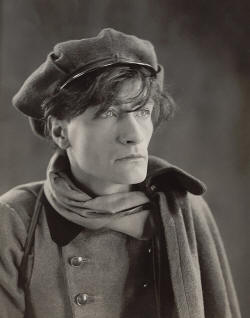

Queer Places:
Cimetière Saint-Pierre
Marseille, Departement des Bouches-du-Rhône, Provence-Alpes-Côte d'Azur, France
 Antoine
Henri Joseph Artaud, better known as Antonin Artaud (4 September 1896 – 4
March 1948), was a French dramatist, poet, essayist, actor, and theatre
director, widely recognized as one of the major figures of twentieth-century
theatre and the European avant-garde.[1][2][3][4]
He is best known for conceptualizing a 'Theatre of Cruelty'.[5]
Antoine
Henri Joseph Artaud, better known as Antonin Artaud (4 September 1896 – 4
March 1948), was a French dramatist, poet, essayist, actor, and theatre
director, widely recognized as one of the major figures of twentieth-century
theatre and the European avant-garde.[1][2][3][4]
He is best known for conceptualizing a 'Theatre of Cruelty'.[5]
Antonin Artaud was born in Marseille, France, to Euphrasie Nalpas and Antoine-Roi Artaud.[6] Both his parents were natives of Smyrna (modern-day İzmir),[7]:15 and he was greatly affected by his Greek ancestry.[6][7] Antoine-Roi Artaud was a shipowner.[4] Euphrasie gave birth to nine children, but four were stillborn and two others died in childhood. Artaud was diagnosed with meningitis at age five, a disease which had no cure at the time. Biographer David Shafer points out, "given the frequency of such misdiagnoses, coupled with the absence of a treatment (and consequent near-minimal survival rate) and the symptoms he had, it’s unlikely that Artaud actually contracted it."[7] After a long struggle including a comatose period, a severely weakened Antonin survived.[8] Artaud's parents arranged a series of sanatorium stays for their temperamental son, which were both prolonged and expensive. This lasted five years, with a break of two months in June and July 1916, when Artaud was conscripted into the French Army. He was discharged due to addiction to laudanum and mental instability. During Artaud's "rest cures" at the sanatorium, he read Arthur Rimbaud, Charles Baudelaire, and Edgar Allan Poe. In May 1919, the director of the sanatorium prescribed laudanum for Artaud, precipitating a lifelong addiction to that and other opiates.[9] He suffered a nervous breakdown at age 19; this was not the end of his mental illness.[4]
In March 1921, Artaud moved to Paris to pursue a career as a writer (against his father's wishes).[4] While training and performing with directors including Charles Dullin and Georges Pitoëff, he continued to write both poetry and essays. At the age of 27, he mailed some of his poems to the journal La Nouvelle Revue Française; they were rejected, but the editor, Jacques Rivière, wrote back seeking to understand him, and a relationship via letters developed. Their compilation into an epistolary work, Correspondance avec Jacques Rivière, was Artaud's first major publication.
His first work in the theatre was with French theatre director Lugné Poe who described Artaud as "a painter lost in the midst of actors".[10]:350
In January 1948, Artaud was diagnosed with colorectal cancer. He died shortly afterwards on 4 March 1948 in a psychiatric clinic in Ivry-sur-Seine, a commune in the southeastern suburbs of Paris.[25] He was found by the gardener of the estate seated alone at the foot of his bed, and it was suspected that he died from a lethal dose of the drug chloral hydrate, although it is unknown whether he was aware of its lethality.[25]
Thirty years after its recording and production in November 1947, French radio finally broadcast the performance of Pour en Finir avec le Jugement de dieu.
My published books: